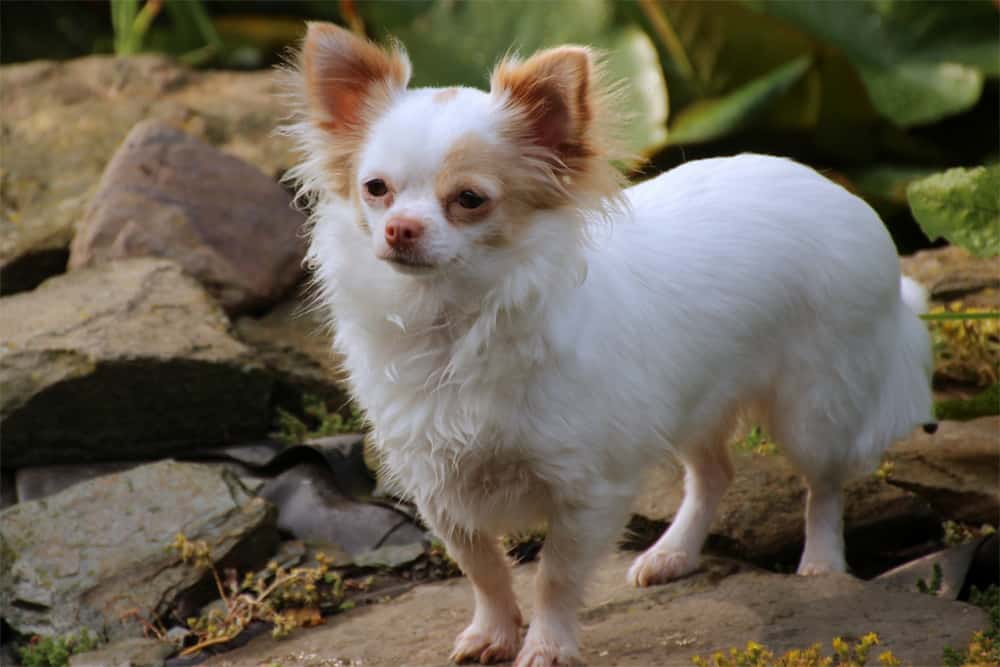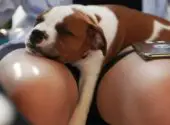Small, fluffy, and super cute, it comes as no surprise that chihuahuas are amongst the most popular breeds for many dog owners, ranking 11th in a study by the American Kennel Club.
One of the main concerns with the breed, however, can be the number of health and emotional issues that they can be prone to, and this can be a little overwhelming for first-time owners.
One of the most common issues associated with chihuahuas is their tendency to shake, shiver, and tremble, and this can be quite frightening if you are a new owner, or not used to the ways and wiles of these cute pooches.

Fortunately, there are a number of potential reasons for your dog’s behavior, and we will have put together the ultimate guide to reassure worried chihuahua owners – read on for everything you need to know.
This will help you to decide when medical care may be needed, and when you don’t need to worry.
Why Do Chihuahuas Shake?
There are several possible reasons why your pet may have the shakes, and they are not always urgent or a risk to the health of your pup – it may simply be part of their temperament.
Below, we will explore some of the most common reasons, and make sure you have the information you need.
1. High Metabolism
Chihuahuas are the smallest dogs in the world, and this means that their vital organs are a lot smaller than those of other animals – particularly their stomachs. As a result, they will typically burn calories up to three times faster than larger dog breeds, and have a super-fast metabolism.
This faster metabolism can cause your dog to shake if they get excited or frightened, and the pace of shaking increases as the emotion does.
A higher metabolism is also linked to how effectively chihuahuas are able to regulate their own body temperature.
They tend to burn off their heat more quickly, and so are more likely to feel the cold – even if you think it is relatively mild. These pooches also possess lower percentages of body fat, meaning that they are unable to tolerate lower, colder temperatures, especially when combined with their higher metabolisms.
This is the true reason for chihuahua clothing – it is not just there to help your pup look cute.
In fact, making sure that your dog is dressed warmly in jackets and jumpers is part of responsible pet ownership, and you should keep a close eye on your dog when they are out and about.
If they start shivering add another layer of clothing and hold them close to your body to share body warmth.
You should also ensure that you dry your dog if they get wet on a walk – use a soft, warm towel or even a hairdryer if your pup can handle it – and have a reliable heating system to keep your home at the perfect temperature.
They should have their own warm bed, with plenty of blankets, and this needs to be placed out of reach of any draughts or cold spots.
2. Fear Or Anxiety
Ensuring that your chihuahua is socialized properly is an important consideration – many of these dogs will shake or tremble when they are nervous, scared, or upset, and this is a common side effect of dogs who have been poorly socialized, especially if they find themselves surrounded by larger, more excitable dogs.
Get them used to being around other pooches from a young age through gentle, gradual exposure – this will help your dog to realize that there is nothing to be frightened of, and make sure that they are comfortable around a range of animals.
This, in turn, will reduce their anxiety and stress, and reduce the chances of them shaking or trembling.
Another potential means of addressing this is to ensure that your chihuahua gets plenty of exercise – just as humans can get stressed and anxious if they are cooped up, the same can be true for animals.
Get your dog out for a good walk of at least 39 minutes a minimum of once a day to help raise their endorphin levels, stimulate their brain function, and help improve mood and confidence – this can also be a good opportunity for them to encounter other dogs in a safe, controlled manner.
Heading to a dog park or field can also be a good option, as your pooch can run around and get some exercise safely while observing their peers from a safe distance!
3. Excitement
One of the nicest reasons your chihuahua may shake is due to good old-fashioned excitement!
These dogs typically express their joy or excitement for a particular situation by jumping, spinning, barking, yapping, or shaking, and if this is the case, there is nothing for you to worry about.
You may find that this is particularly common as you are serving up dinner, or preparing a tasty treat…
4. Anxiety
A less pleasant motivation for your chihuahua to tremble may be that they are feeling frightened or anxious – and when you consider how small they are, this is hardly a surprising reaction to the world around them.
The world is likely to appear very big, and elements that you would never give a second glance to are a thing of nightmares for your pup. This fear may be expressed through shaking, as a visual representation that something is bothering your pet.

Chihuahuas are also super smart, and this means that they may anticipate negativity or conflict based on the actions you take and the tone of your voice.
This doesn’t mean, of course, that you should not train your dog effectively – this is an essential element of responsible dog ownership – but it does mean you may need to be a little bit more mindful of your behavior around your pet.
Receiving a scolding could result in anxiety, which can, in turn, lead to uncontrollable shaking or trembling which is distressing to witness. Chis are adept at recognizing even subtle changes in behavior or tones of voice, and this can cause them tremendous amounts of stress.
While this is unpleasant for owners to witness, there are ways to help alleviate anxiety, while still ensuring that your pooch learns the behavioral norms and requirements.
Deal with any unwanted behavior in a calm, firm manner, using a measured, firm but calm tone of voice, and make sure that you are consistent – your pet will soon associate this tone with negative behavior but will expect and recognize the consequences, helping to remove their stress.
While there may still be some shaking, gradual reinforcement will help to turn the reaction from fear and anxiety to a more general annoyance or displeasure at being prevented from doing something. Consistency is the key here – once your chi knows what to expect, they will have less to be anxious about.
You can also help to reduce anxiety in other areas, such as ensuring good socialization and exposure to other dogs during the puppy years, reducing stress at mixing with a variety of sizes and breeds.
If you notice that your pet is shaking, trembling, or becoming visibly anxious when around other dogs, pop them on the leash and move them away to the situation to calm down and relax.
Separation anxiety is another key point of conflict for many chis – they are sociable creatures and can struggle to be left alone. Maintain a calm, simple, and “no big deal” attitude when you leave the house – if you are not making a fuss, then chances are high that they won’t either.
Rather than shower them with hugs and emotional kisses, use a matter-of-fact approach, and gradually build up exposure, leaving them for five minutes, then ten and so on, until they get used to spending time alone.
Consider your home environment – is there an area that seems to be causing your chihuahua particular distress, or an area where they tremble the most?
Making small changes to your home can have a big impact on relaxing your pet, such as ensuring that they have a quiet, private place to go, removing strong smells or sounds, or simply changing their bed to a different space.
If you need extra advice, it can be a good idea to contact a canine therapist or specialist to see if they have any tips or specific advice for your pooch. Once the anxiety is reduced or eliminated, the trembling should begin to calm down.
5. Old Age
If we are lucky, old age catches up with all of us, and our precious pets are no exception. Older chihuahuas are prone to shakes, tremors, and shivers in their front or hind legs, and these may become more pronounced with age.
While this is a common ailment, it is a good idea to take older chis to the vet if you notice them shaking or trembling more often, just to rule out anything more serious.
In some cases, your dog may have injured or hurt themselves, and so a quick check-up ensures that there is nothing more serious going on while putting your mind at rest. Once your pooch has the all-clear, you can simply treat the tremors with plenty of snuggles.
6. Hypoglycemia (Low Blood Sugar)
In some cases, the shivering can be the result of something more serious, such as low blood sugar, also known as hypoglycemia. This can be a serious condition, and recognizing the signs as early as possible is important for helping keep your dog healthy.
In the simplest terms, the brain uses glucose to gain its energy and function normally.
If there are low levels of glucose in the blood, the brain is unable to function normally, and this can cause a series of neurological symptoms such as confusion, disorientation, trembling, and shivering.
Some of the most common symptoms of low blood pressure in chihuahuas include:
- Lethargy
- Intense shaking or trembling
- Confusion
- Lack of coordination
- Drowsiness
- Cold to the touch
- Difficulty standing or walking
- Bluish tinge or discoloration around gums or skin
If low blood sugar is not addressed quickly, the consequences can be severe, resulting in seizures and, in some tragic cases, even death. The good news, however, is that hypoglycemia can easily be treated as long as the symptoms are recognized in time.
Your vet will be able to give you advice tailored to your pet, but as a general rule, you should switch the way you feed your chi so that they receive smaller meals all throughout the day – for example, 3 to 5 smaller meals, rather than two larger ones.
Keeping a small dropper filled with sugar water can also be an easy way to bring your chihuahua’s sugar levels back up when you realize they have dropped.
7. Generalized Tremor Syndrome (GTS)
In some cases, your chihuahua’s shaking can be a sign of an underlying health condition, such as Generalized Tremor Syndrome, or GTS. If you have run through the list above and are still drawing a blank, this should be the next avenue for your research.
GTS is not a condition unique to chihuahuas – it can impact any breed or size of dog – but it can be harder to diagnose in chis because it can be mistaken for low body temperature or anxiety – both of which, as we have seen, are common in this breed.
Symptoms are likely to develop between the ages of 9 months and 2 years, and your vet will typically be your first port of call. If you have concerns, take your pooch for a check-up. Your practitioner will run a full physical check and ask for information on their symptoms, recent behavior, and usual physical activity.
Depending on the severity of the condition, and the strength of the tremors, your vet may prescribe inpatient or outpatient care, though the usual course of action is using corticosteroids prescribed by your veterinarian – here, you should see results within a week.
8. Poison
In extreme cases, ongoing shaking or trembling could be a sign that your dog has been poisoned, and you need to act immediately if you suspect that this is the case. The tiny sizes of chihuahuas means that even a small amount of a toxin has the potential to be fatal, and you should get them to the vet immediately.
Some common signs that your chi may have been poisoned include:
- Sudden, intense shaking that appears out of nowhere
- Drooling
- Vomiting
- Sudden onset of diarrhea
- Seizures
- Weakness and disorientation
- Dehydration or wanting a lot of water
- A swollen or bloated face
- Bringing up blood while coughing
While the worst-case scenario involves someone deliberately targeting your chihuahua, there are also a number of sources that could cause accidental poisoning – once again, it only takes a small amount to cause serious damage to such small dogs.
Several foods are toxic to canines, and this includes human favorites such as chocolate or raisins.
Household chemicals are also dangerous, particularly insecticides, so make sure that all surfaces are fully wiped and washed down before letting your chihuahua interact with them.
Unexpected items such as cigarettes and chewing gum can also be poisonous, thanks to the inclusion of nicotine and Xylitol respectively.
Keep your pup healthy by making sure anything potentially dangerous is well out of their reach, and rushing them to the vet if you suspect poison.
9. Kidney Disease
In some cases, ongoing shaking could be a symptom of kidney disease, a condition that tends to be more common in longhaired chihuahuas. Issues can occur if your pet eats something toxic or poisonous, or if there is an obstruction in the urinary tract, such as kidney stones.
In both cases, you will need to see your vet as a matter of urgency, as kidney conditions can quickly go downhill if left untreated. In some situations, surgery may be recommended, and your vet may also prescribe medication or another solution.
If your chihuahua is shaking a lot, and this is combined with symptoms such as sudden weight loss, pale gums, bloody eyes, and weakness or disorientation, get in touch with your veterinarian as a matter of urgency.
10. Infection
According to vets, one of the most common reasons for them to see their patients is to help clear up an ear infection. This can be a particular issue with chihuahuas, as they tend to produce an excessive amount of earwax, which needs to be cleaned out on a regular basis.

If too much earwax builds up, an infection can arise, and you will need to head to the vet for antibiotics or treatment – this can usually be carried out at home. Allergies or moisture can also cause irritation in the ears, and your chi may try to alleviate this by shaking their head.
If your pooch is shaking their body, and also seems to have a high temperature, itchy, smelly ears, or you notice that the ears are red and swollen with a dark or yellowish discharge, this could be a sign of an infection, and you should seek a vet as soon as you can.
11. Injury
The tiny size of chihuahuas means that they are prone to injury, and this may be sustained internally. In some scenarios, your pet may try to tell you that they are in pain using whining, limping, or yelping, and if their body is in shock, they may also shake and tremble.
If you spot unexplained shaking, combined with any bruising, weakness and lethargy, glazed eyes, a change in gum color, and black diarrhea, or if your chi is reluctant to be touched or vomiting blood, this could be a sign that something is going on inside.
The best advice is to seek advice from your vet; they may prescribe medication such as painkillers, antibiotics, or treatment for arrhythmia or heart issues.
In more serious cases, surgery may be required – chis have tiny bones, and breaks and fractures can be very common.
12. Allergic Reactions
If the shivering appears to come from nowhere, it could be a sign of an allergic reaction – take a moment to consider whether you have changed anything in your dog’s diet, such as their food choice a new ingredient, or even new treats, the onset of tremors could be an indication that your dog is not reacting in a positive manner.
Try removing the offending item from your pooches’ diet, and see if this makes any difference to their symptoms.
If the shivering does not stop or seems to be getting more intense, it is a good idea to make contact with your vet as soon as you can – in many cases, allergic reactions will not simply fade away on their own, so you may need specialist advice or assistance.
A full allergy test can show you where any problems lie, and may even save your pet’s life.
13. Nausea Or Vomiting
As humans, it is common for us to shake when we are violently sick, and even if we feel a little nauseous, and this can also be the case for your pet. If your chi is yawning, lip-smacking, or seems to be drooling excessively alongside the shivering, they could be feeling a little nauseous.
Causes can range from overeating, eating something they shouldn’t have done, or taking a medication that didn’t agree with them.
You should take your pet to the vet if they experience sudden vomiting with no clear cause, and especially if you suspect they have eaten something they shouldn’t have done – fast action is crucial in these situations.
14. Neurological Conditions
Shaking, shivering, or trembling could be the sign of an underlying neurological disorder, such as seizures or epilepsy, or a symptom of a condition such as a brain tumor.
Seizures will often be the first indication you have that something is wrong, and this can be accompanied by drooling, stiffening, or foaming at the mouth, followed by collapse, twitching of muscles, and, in some cases, a loss of consciousness.
Shaking can often be the first sign that something is wrong, and once your dog has been diagnosed, you can usually treat most seizures with medication. Make sure you contact your vet for a full examination, to make sure your pet is getting the correct care and treatment.
15. Viral Causes
Trembling can sometimes have a viral cause, such as Canine Distemper – a common condition in dogs who have not had all of their required vaccinations. In chihuahuas, distemper often causes shakes and tremors in the body, alongside symptoms including coughs, fevers, and discharge from the eyes and nose.
Distemper must be treated by a vet, who is likely to prescribe antibiotics, as well as airway dilators and, in some cases, physical therapy, depending on the severity of the symptoms.
16. Overstimulation
In some cases, your chihuahua may simply be overwhelmed and overstimulated by everything that is going on – and it is no surprise, given their tiny size.
If medical conditions and concerns have been ruled out, it may be worth just giving your chi some time, space, and quiet privacy to allow them to calm themselves down, and get back to normal.
Final Thoughts
Seeing your chihuahua shake and shiver can be unpleasant for owners, but in many cases, there is a simple underlying cause, which has nothing to do with your pooches’ health.
In situations where an underlying health issue is discovered, swift, effective action by your vet can make all the difference.
As you get to know your dog, you will become more familiar with their quirks, fears, and personalities, making it easier to spot when something is not quite right and allowing you to feel confident that you can take excellent care of your chi, no matter the situation.




